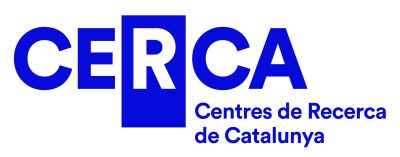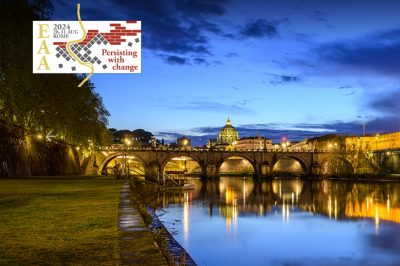
As summer came to a close, ICAC-CERCA made a strong impact at the 30th Annual Meeting of the European Association of Archaeologists (EAA), held in Rome from August 28th to 31st.
This major event brought together experts worldwide to explore the diversity and complexity of archaeological practice, from historical interpretation to heritage management and the politics of the past and present.
ICAC’s outstanding presence included 19 contributions and leadership in seven sessions, reflecting the depth and breadth of our research.
The following is a breakdown of contributions by research group:
GIAP researchers contributed 13 presentations and organized 5 sessions at the 30th EAA Annual Meeting.
Sessions:
- Valentina Pescini was the primary organizer of Session 482: ‘Past Is Not Past’. Environmental Effects of Past Land Use on Present Resources Ecology. Environmental Archaeology between Research and Application.
- Federica Riso, Alexandra Livarda, and Patricia Vandorpe co-organized Session 598: The Archaeobotany of the Cities and Urban Landscapes.
- Faidon Moudopolous-Athanasiou was the primary organizer of Session 669: Ottoman-era/historical Archaeology: Materials and Methods in Context.
- Alexandra Kriti was the primary organizer of Session 1009: Beyond the Lens: Contemporary Methods and Interdisciplinary Synergies in Archaeology.
- Iban Berganzo-Besga and Nazarij Bulawka co-organized Session 1071: Machine Learning Methods in Archaeological Research: New Approaches, Barriers and Standardization.
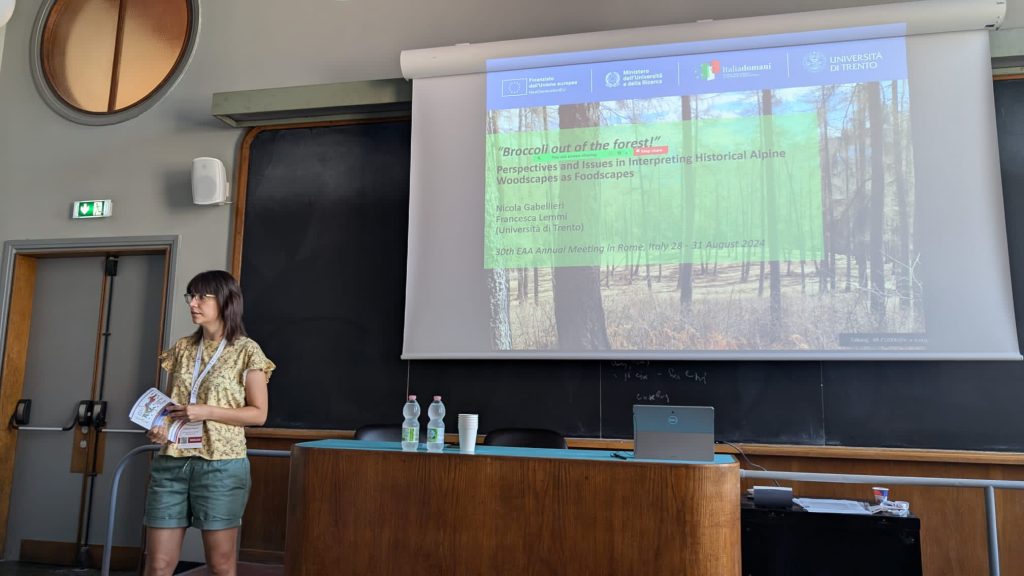
Presentations:
- Valentina Pescini (ICAC-CERCA) along with Lorenzo Braga, Eleonora Rattighieri, Ivano Rellini and Assunta Florenzano (Università degli Studi di Modena e Reggio Emilia) presented “Transhumance Landscapes in the Southwestern Italian Alps: The Contribution of Palynology in Environmental and Cultural Heritage” (Session 482. ‘Past Is Not Past’: Environmental Effects of Past Land Use on Present Resources Ecology. Environmental Archaeology Between Research and Application).
- Chiara Messana (UAB-IPHES), Carles Tornero (UAB-IPHES) and Lídia Colominas (ICAC-CERCA) presented “Beyond Grazing: A Multi-isotope Approach to Investigate Sheep Feeding Strategies in the Iron Age Iberian Peninsula (3rd C. Bc)” (Session 463. Methods of Analysing Subsistence Resources, Landscape Management and Exploitation Practices Between the Bronze Age and Iron Age).
- Andrew Mclean (ICAC-CERCA) and Šprem, Katarina (independent researcher) presented “Connectivity, Road Networks And The Rural Economy Of Roman Istria” (Session 390. Modelling Connections: New Methodologies to Understand Human Mobility, Route Networks and Land).
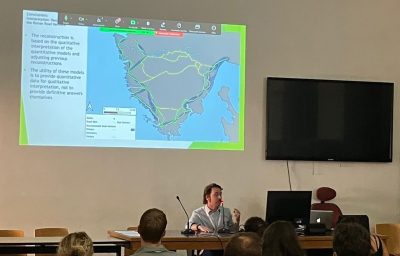
- Faidon Moudopolous-Athanasiou (ICAC-CERCA) presented “Milk Without Honey: An Archaeological Ethnography of Lime Across the Albanian-greek Border and the Early Modern Cultural Landscape” (Session 505. Ethnographies of Makers and Making: Traditional Craft and Technology in Contemporary Societies).
- Theoni Baniou, Alexandra Livarda and Patricia Vandorpe (ICAC-CERCA), and Núria Romaní (UAB) presented “Digging in The Wells: Food and Trade Relations in Roman Guissona” (Session 598. The Archaeobotany of Cities and Urban Landscapes).
- Federica Riso and Alexandra Livarda (ICAC-CERCA) presented “An Archaeobotanical Exploration of Urban Food Practices Through Time in Roman Italy” (Session 598. The Archaeobotany of Cities and Urban Landscapes).
- Patricia Vandorpe and Alexandra Livarda (ICAC-CERCA) presented “Food Plants and Social Dynamics in the Urban Settlements of the Northern Roman Provinces” (Session 598. The Archaeobotany of Cities and Urban Landscapes).
- Nazarij Bulawka (ICAC-CERCA) and Hèctor A. Orengo (ICREA-ICAC) presented “Underthesands: Investigating Ancient Irrigation Landscapes in Arid Climates Through Remote Sensing and Deep Learning Methods” (Session 745. Remote Sensing of the Changing Mediterranean, Middle East and North Africa Region).
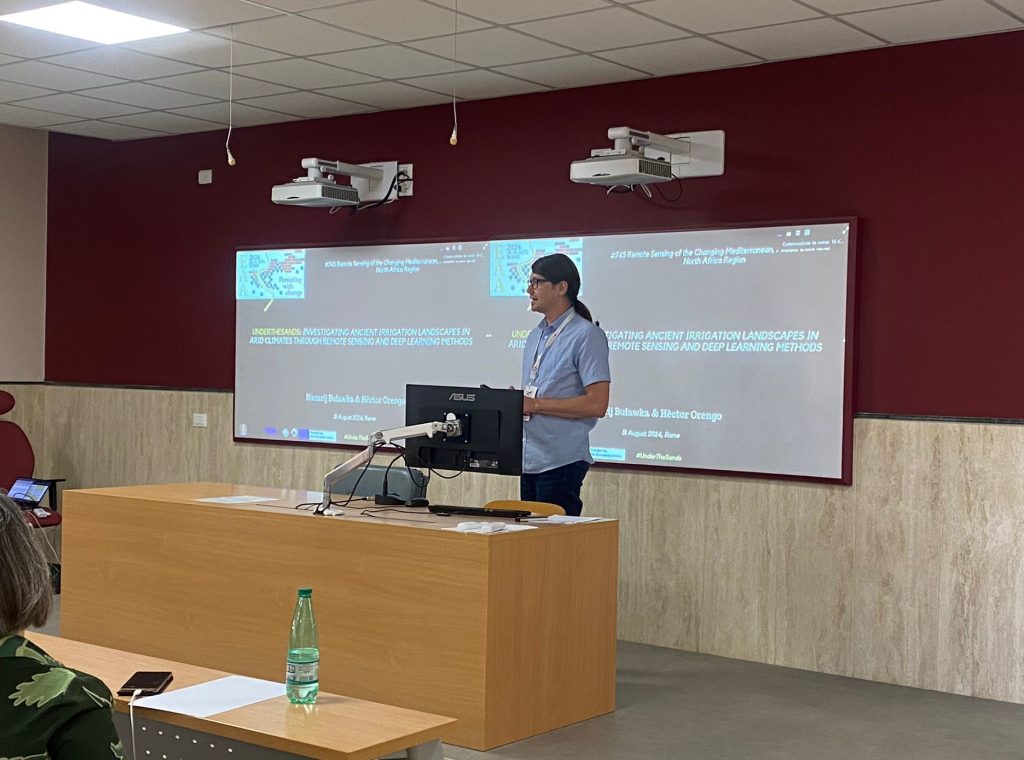
- Laura Strolin and Lídia Colominas (ICAC-CERCA), and Gabriella Petrucci (independent researcher) presented “Investigating Animal Mobility in the Roman World. A Geometric Morphometric Study of Faunal Remains from North-eastern Iberian and Italian Peninsulas” (Session 904. Mobility, Movement and Interaction in the Ancient World: New Avenues of Interpretation).
- Alexandra Kriti (ICAC-CERCA), Alexandra Livarda (ICAC-CERCA), Hèctor A. Orengo (ICREA-ICAC), Ioannis Mylonas (HAO-IPBGR) and Eñossavet Ninou (International Hellenic University) presented “Lab-induced Heating of Greek Barley (H.Vulgare) Landraces; A Set of Experimental Methods to Explore Past Agricultural Practices” (Session 1009. Beyond The Lens: Contemporary Methods And Interdisciplinary Synergies In Archaeobotany).
- Sayantani Neogi and Francesc Conesa (ICAC-CERCA), and Hèctor A. Orengo (ICREA-ICAC) presented “Post-conflict Landscapes in Eastern Mediterranean: Geoarchaeological and Automated Remote Sensing Mapping of Vulnerable Archaeological Soilscapes in the Lebanese Bekka Valley” (Session 745. Remote Sensing of the Changing Mediterranean, Middle East and North Africa Region).
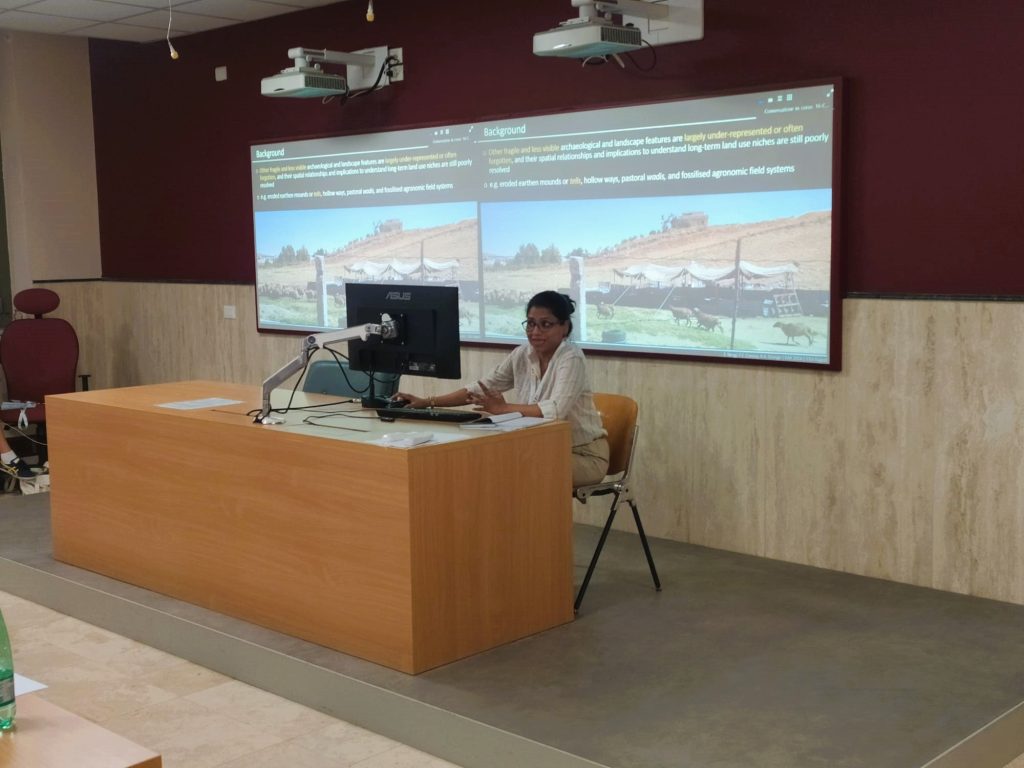
- Iban Berganzo-Besga (Univ. of Toronto Mississauga), Hèctor A. Orengo (ICREA-ICAC), and Felipe Lumbreras (CVC-UAB) presented “Computer Vision Best Practices in Computational Archaeology” (Session 1071. Machine Learning Methods in Archaeological Research: New Approaches, Barriers and Standardization).
- Valentina Pescini (ICAC) and Nicola Gabellieri (Univ. di Trento) presented “Interdisciplinary Research on Charcoal Kiln Sites in Montieri (Tuscanyitaly): Environmental Dynamics and Woodmanship Practices between 18th-20th Century” (Session 1082. The Archaeology of Eu-potarch: The Production of Potash, Tar, Resin and Charcoal in the Archaeological Record).
MIRMED researchers made 4 contributions and co-organized 2 sessions at the 30th EAA Annual Meeting.
Sessions:
- Marta Mateu, M. Carme Belarte, and María Pastor organized Session 160: Mysterious Mud: A Transversal Approach to Interpreting Unsolved Earthen Remains.
- Enric Colom co-organized Session 417: Hispania and the Mediterranean: New Approaches to the Analysis of Sea-and-inland Networks (3rd C. Bc-7th C. Ad).
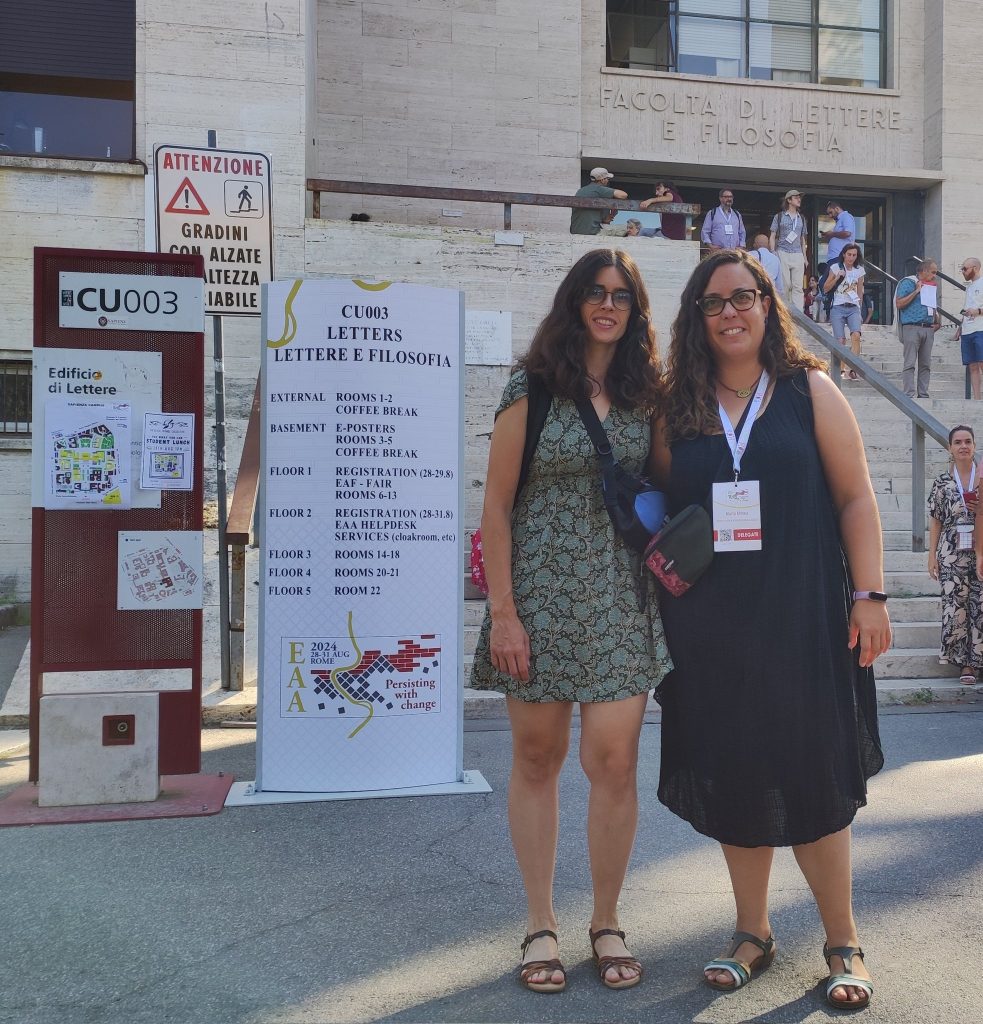
Presentations:
- Marta Mateu, (ICAC-CERCA), M. Carme Belarte (ICREA-ICAC), María Pastor (UA-ICAC) and Carme Saorin (UB) presented “From the Hearth: Differentiating Combustion Surfaces from Other Hardened Flat Earthen Fragments” (Session 160. Mysterious Mud: A Transversal Approach to Interpreting Unsolved Earthen Remains).
- Enric Colom (UnED-ICAC) and Ramon Járrega (ICAC-CERCA) presented “New Evidence of Trade Networks Between Hispania and Rome” (Session 417. Hispania and the Mediterranean: New Approaches to the Analysis of Sea-and-inland Networks (3rd C. Bc-7th C. Ad).
- Maria Rueda and Ramon Járrega (ICAC-CERCA) presented “The Value of Dolia in the Assessment of the Roman Rural Organization. A Case of Study Form North-western Hispania” (Session 468. The Relationship Between Rural Settlements and the Territory During the Roman Period and Late Antiquity).
- M. Carme Belarte (ICREA-ICAC), Marta Mateu (ICAC-CERCA), María Pastor (UA-ICAC), Carme Saorín (UB), Dani López (Arqueovitis, Sccl), Joan Canela (ICAC), Antoni Corrales (ICAC), Georgina Prats (Univ. de Lleida) and Maria Anguera (ICAC) presented “Hearths or Plasters? A Methodological Proposal to Interpret Flat Surface Earthen Remains from Mediterranean Protohistoric Secondary Contexts” (Session 997. Cha?Ne Op?Ratoire and Life Cycle of Protohistoric and Ancient Building Materials).
ArPA-LIRA researchers participated with 2 contributions at the 30th EAA Annual Meeting.
- Simona Perna (ICAC-CERCA) presented “Crossing Paths. People-craft Interaction in Greek and Roman Stone Working. Insights From Marble and Decorative Stone Vases” (Session 814. Materialising Meaning. Centreing The Role of Social Interactions in Archaeomaterials Studies).
- Owain Morris presented “Far from the ‘Med-ding’ Crowd? Gender, Networks, and the Wool Trade in Eia Hirpinia” (Session 1173. Gender and Economies in Transition in the 1st Millennium Bc Mediterranean).
The 30th EAA Annual Meeting was a highly productive event for ICAC-CERCA researchers, who played key roles in shaping discussions and advancing knowledge in archaeological practice.
With diverse contributions from advanced methodological approaches to interdisciplinary collaborations, ICAC-CERCA continues to influence the global archaeological landscape.
We look forward to applying the insights gained and furthering our research in the coming year!
About the Catalan Institute of Classical Archaeology (ICAC-CERCA)
The Catalan Institute of Classical Archaeology (ICAC-CERCA) is a CERCA center established as a consortium in 2003 by the Government of Catalonia and the Rovira i Virgili University. It is a Catalan institution with an international scope, at the forefront of research and conservation of archaeological heritage. Its headquarters are located in Tarragona, a city recognized as a UNESCO World Heritage Site in the year 2000. Its researchers work to understand the past through the study of archaeological remains and promote the preservation of the historical legacy. We are CERCA!
For more information, visit www.icac.cat.
